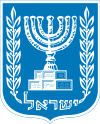- Nineteenth government of Israel
-
Israel 
This article is part of the series:
Politics and government of
Israel- Basic Laws
- Law of Return
- President (List)
- Prime Minister (List)
- Cabinet
- Security Cabinet
- Kitchen Cabinet
- Security Cabinet
- State Comptroller
- Knesset
- Elections: 2006, 2009
- Judicial system
- Supreme Court
- Attorney General
- Yehuda Weinstein
- Districts
- Local government
- Foreign affairs
- Israel and the UN
- Israel and the EU
- Ambassadors
- Israeli-Palestinian conflict
- Arab-Israeli conflict
The Nineteenth government of Israel was formed by Menachem Begin on 5 August 1981, following the June elections. Begin included Likud, the National Religious Party, Agudat Yisrael, Tami and Telem in his coalition, which held 63 of the 120 seats in the Knesset, and the cabinet had 17 ministers. On 26 August Tehiya joined the coalition, and the number of ministers rose to 18.
Begin resigned as Prime Minister in August 1983, and Yitzhak Shamir formed the twentieth government on 10 October, which held office until after the 1984 elections.
Cabinet members
1 Died in office.
2 Although Arens was not an MK at the time, he had been elected to the Knesset on the Likud list.
3 Berman resigned from the government due to its attitude towards the Kahan Commission.[1]
3 Abuhatzira resigned from the government after being convicted of larceny, breach of trust and fraud.[2]
References
- ^ Yitzhak Berman: Particulars Knesset website
- ^ American Jewish Yearbook 1984 p66
External links
- Tenth Knesset: Government 19 Knesset website
 Governments of Israel
Governments of Israel
 Categories:
Categories:- Cabinets of Israel
Wikimedia Foundation. 2010.
